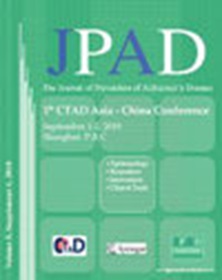2q12位点的多态性簇可以预测轻度阿尔茨海默病患者对吡美拉汀的反应
IF 7.8
3区 医学
Q1 CLINICAL NEUROLOGY
引用次数: 5
摘要
吡罗美汀是一种新型的褪黑素MT1/2/3和5-羟色胺5-HT-1A/1D受体激动剂,用于治疗轻度阿尔茨海默病(AD)。在一项随机、安慰剂对照、剂量范围研究(ReCognition)中,对患有AD引起的轻度痴呆的参与者(n=371,年龄60-85岁)服用吡罗美汀(每天5、20和50 mg,持续6个月),吡罗美汀和安慰剂治疗组在主要结果(即计算机神经心理测试组(cNTB))和次要结果(ADCS-CGIC、ADCS-MCI-ADL、ADAS-cog14、NPI和匹兹堡睡眠质量指数(PSQI))方面没有发现统计学上的显著差异,也没有安全问题(https://clinicaltrials.gov/ct2/show/NCT02615002)。本研究旨在使用全基因组关联方法(GWAS)鉴定预测吡罗美汀治疗反应的遗传标志物。使用从同意的参与者的淋巴细胞中提取的DNA进行全基因组和全外显子组组合测序的变异基因分型。使用Cochran-Armitage趋势测试,对吡罗美汀治疗的参与者进行一般病例对照等位基因测试,将“应答者”(即cNTB中与基线相比变化>0.125)作为病例,将“无应答者”作为对照。美国58家门诊诊所。371名参与者在试验中被随机分配;107提供了基因分型的知情同意书。GWAS样本在人口统计学、基线特征或对吡罗美汀的反应方面与完整的研究队列没有差异。染色体2q12上的6个单核苷酸多态性(SNPs)(2:107510000-107540000)与反应相关(p值各<1×10−4)。事后分析表明,与安慰剂相比,2q12多态性簇的携带者(GWAS样本的27%)在吡罗美汀的cNTB上显著改善,但在ADAS-Cog14和PSQI上显著恶化。相比之下,在ADAS-Cog14(20 mg吡罗美汀2.91(N=23),安慰剂1.65(N=19)(p=0.03))和PSQI中,与安慰剂相比,“非携带者”使用吡罗美丁显著改善。2q12(2:107510000-107540000)5–6 SNPs聚类可能预测吡罗美汀治疗轻度AD的疗效。这些发现值得在一项更大规模、前瞻性的早期AD临床试验中对非2q12多态性聚类携带者进行进一步研究。本文章由计算机程序翻译,如有差异,请以英文原文为准。
A Polymorphism Cluster at the 2q12 locus May Predict Response to Piromelatine in Patients with Mild Alzheimer’s Disease
Piromelatine is a novel melatonin MT1/2/3 and serotonin 5-HT-1A/1D receptors agonist developed for mild Alzheimer’s disease (AD). In a randomized, placebo-controlled, dose-ranging study (ReCognition) of piromelatine (5, 20, and 50 mg daily for 6 months) in participants with mild dementia due to AD (n=371, age 60–85 years), no statistically significant differences were found between the piromelatine and placebo-treated groups on the primary (i.e., computerized neuropsychological test battery (cNTB)) and secondary outcomes (ADCS-CGIC, ADCS-MCI-ADL, ADAS-cog14, NPI, and Pittsburgh Sleep Quality Index (PSQI)) nor were there safety concerns (https://clinicaltrials.gov/ct2/show/NCT02615002). This study was aimed at identifying genetic markers predicting piromelatine treatment response using a genome-wide association approach (GWAS). Variant genotyping of a combined whole genome and whole exome sequencing was performed using DNA extracted from lymphocytes from consenting participants. The general case-control allelic test was performed on piromelatine-treated participants, taking “responders” (i.e., >0.125 change from baseline in the cNTB) as cases and “non responders” as controls, using a Cochran-Armitage trend test. 58 outpatient clinics in the US. 371 participants were randomized in the trial; 107 provided informed consent for genotyping. The GWAS sample did not differ from the full study cohort in demographics, baseline characteristics, or response to piromelatine. Six single-nucleotide polymorphisms (SNPs) in chromosome 2q12 (2:107,510,000-107,540,000) were associated with response (p-value < 1×10 −4 each). Post hoc analyses suggested that the carriers of the 2q12 polymorphism cluster (27% of the GWAS sample) improved significantly on the cNTB on piromelatine as compared to placebo but significantly worsened on the ADAS-Cog14 and PSQI. By contrast, “non-carriers” improved significantly with piromelatine compared to placebo on the ADAS-Cog14 (2.91 (N=23) with piromelatine 20 mg vs 1.65 (N=19) with placebo (p=0.03)) and PSQI. The 2q12 (2:107,510,000-107,540,000) 5–6 SNPs cluster may predict efficacy of piromelatine for mild AD. These findings warrant further investigation in a larger, prospective early-stage AD clinical trial for patients who are non-carriers of the 2q12 polymorphism cluster.
求助全文
通过发布文献求助,成功后即可免费获取论文全文。
去求助
来源期刊

Jpad-Journal of Prevention of Alzheimers Disease
CLINICAL NEUROLOGY-
自引率
7.80%
发文量
85
期刊介绍:
The JPAD « Journal of Prevention of Alzheimer’Disease » will publish reviews, original research articles and short reports to improve our knowledge in the field of Alzheimer prevention including : neurosciences, biomarkers, imaging, epidemiology, public health, physical cognitive exercise, nutrition, risk and protective factors, drug development, trials design, and heath economic outcomes.
JPAD will publish also the meeting abstracts from Clinical Trial on Alzheimer Disease (CTAD) and will be distributed both in paper and online version worldwide.
 求助内容:
求助内容: 应助结果提醒方式:
应助结果提醒方式:


